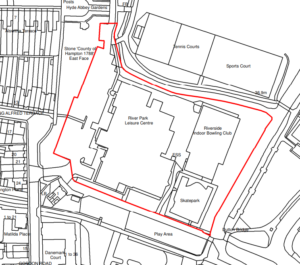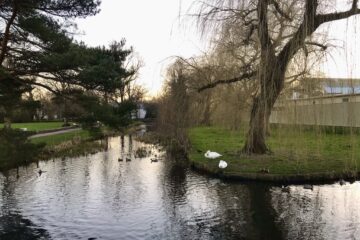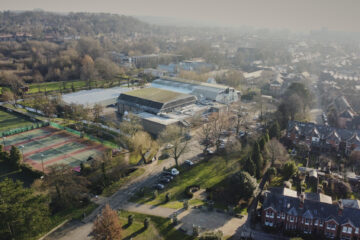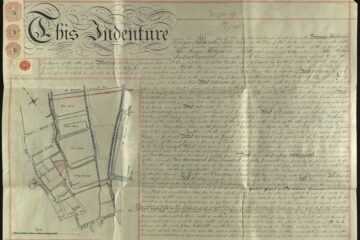
The land lies in the city ward of St Bartholomew. The three Ward Councillors recently sent round a circular. They said, “We wanted to send you an update on plans for the old River Park Leisure Centre as this has a direct impact on so many St Bartholomew residents, and to clarify a number of points, as emotions are running high and there is some misinformation being passed around”. There were five headings, in italics below. We have responded to each in turn.
-
What’s the plan? What about the Skate Park and Bowls Club?
The Council wants to work in partnership with the Winchester School of Art, part of the University of Southampton, by leasing the River Park Leisure Centre site to them to enable them to expand their current facilities here. The University has publicly committed to constructing a new, attractive building with shared educational/community facilities, which could include a performance/concert space, exhibition space, library facilities and a cafe, as part of a multimillion pound investment in Winchester. A full list of these can be found at paragraph 12.7 at the following link – https://democracy.winchester.gov.uk/documents/s17616/CAB3324%20land%20transaction%20re%20RPLC%20site%20and%20associated%20parking%20area.pdf
Our response
The relevant paragraph in the Heads of Terms, agreed by Cabinet at their meeting on 23/11/21, reads:
“The narrative will include the parties’ aspiration for the scheme to include provision for a publically (sic) accessible performance space but without any fixed parameters around that as to the scope and extent of it…
The Buyer will have absolute discretion over the campus scheme…
The Buyer will consult with the Seller on the masterplan and thereafter the planning application and the Seller may make representations but there will be no right of veto on the part of the Seller and no obligation on the part of the Buyer to accommodate the Seller’s comments/representations or amend the masterplan or the application in light of any comments/representations on the part of the Seller.”
Moreover, it is proposed that the University be sold the land on ‘virtual freehold basis’. The Council would lose effective control of the land and could not enforce any promises or verbal commitments.
You may not remember what happened to the University’s ‘commitments’ in regard to the old Winchester Textiles Department: The Textile Conservation Centre was a specialist centre for research and training founded in 1975 by Karen Finch at Hampton Court Palace. Between 1998 and 2009 the centre was merged with the University of Southampton and housed from 1999 in a purpose-designed building at the Winchester School of Art. In April 2009, it was announced that the University of Southampton had decided to close the Textile Conservation Centre, prompting widespread concern from academics and historians – as well as from members of the public. It was said that “half of all textile conservators of the entire world were educated at the TCC, and the scientific level was second to none”. An online petition to save it received thousands of signatures. The University had made promises/commitments to preserve it: their promises/commitments came to nothing.
Importantly, the plan does NOT include any of the green spaces of North Walls Recreation Ground. The plan only affects the site of the old leisure centre building, part of the car park, the indoor bowls club, and the skate park.
Our Response
See the extract from CAB3190 at A below. The Recreation Ground, as a whole, is public open space and subject to a restrictive covenant. The Council cannot, and must not, be permitted to take the area out of the statutory protection of the Open Spaces Act 1906 and Local Government Act 1972, and of the covenant. While it is said that the Council is not proposing to ‘appropriate’ this site, that is exactly what it is doing by leasing (in the contract it is expressed as ‘selling’) part of the open space: it is treating this land as owner. Also, there is no binding guarantee about green spaces even on the RPLC site in the lease: “The Buyer will act in good faith in making available the green open areas of the site pending commencement of the main campus scheme works but the Buyer must have absolute discretion about whether, how much and for how long such arrangements subsist and they must not interfere with the Buyer’s own plans”.
Have you looked at the ‘moat’ around the ‘library’ building recently? If that’s the University’s idea of demonstrating “that their commitment to the environment is aligned with that of the council”, (para 8.1 of CAB3324), the tributaries of the River Itchen flowing around and through the site will be in real danger, as will the surrounding green spaces.
However, the inclusion of the skate park and the indoor bowls club does NOT mean that these facilities will be lost. Under the lease, the University will be required to maintain both facilities. The University has said publicly that they are very keen to improve and enhance the skate park and they will be seeking to involve users in this process. Under the lease the skatepark will remain a community asset, accessible by all. The lease also explicitly requires the University to provide alternative facilities for the indoor bowls club if the current building use is changed.
Our Response
This is not strictly true. The lease states: “Special terms for the Buyer’s rights in relation to the skate park for (i) the Buyer to retain the skate park (subject to any reasonable relocation or remodelling to better incorporate it (sic) into the campus scheme environment) and/or (ii) the Seller to have reasonable input into the Buyer’s management of the skate park land included within the Property as a community use to the reasonable satisfaction of the Seller (eg by way of a jointly agreed management protocol or management agreement (outside the long lease)). The form of any such management protocol or management agreement is to be agreed as part of settling the agreement for lease”. Also, in regard to the Indoor Bowling Club, the lease states: “Apart from any lease of the Riverside Indoor Bowling Club, the Property is to be sold with vacant possession.
Between agreeing these terms and completion of the purchase: the Buyer shall be at liberty to negotiate with the Riverside Indoor Bowling Club about how their club can be factored into the wider campus scheme including potentially relocating them to an alternative suitable site (on terms acceptable to the club)”.
This is far from ensuring that these two facilities will be a) permitted to continue, b) maintained solely or adequately by the University, c) ‘improved or enhanced’ by the University, or d) retained as community assets, accessible by all. There is also no explicit condition requiring that they be relocated by the University in the event that they cannot be ‘factored into the wider campus scheme’.
We will be holding the University of Southampton to account to fulfil the promises it has made. We know the proposal has led to lots of discussion and questions. However, we are confident that if the proposal with the University is constructed in the spirit of civic responsibility that the University has promised, it will be a fantastic addition to Winchester and our ward, offering a range of facilities that the Council could never hope to offer itself. If the community facilities referred to above were funded through the public purse it would cost the Council – and the Winchester District taxpayer – a huge amount, at a time when local authority budgets have been cut to the bone by central government. The University has made a public commitment to work with local residents as it develops its plans for the site, and we will be holding them to this.
Our Response
If the University of Southampton were serious about its expansive promises, it might have demonstrated its ‘spirit of civic responsibility’ by allowing public access to the School of Art campus. It might have maintained its buildings better, as well as the stagnant ‘moat’. It might have opened to the public its café, its gallery and exhibition space, its 80-seat auditorium, and its library (which looks desolate and empty, although it is said to provide IT facilities). The converse is true. For example, the auditorium was made available some three years ago, at commercial rates, to a charity for a series of Heritage Lottery Fund grant-aided lectures – and the audio visual equipment was faulty and there was no air conditioning so it was sweltering.
The University of Southampton bought the old police station site in late 2015. You can see how far they have got with that. Will they treat the River Park site with similar indifference?
-
Is the proposed plan with the University of Southampton lawful?
Yes.
A group of residents called the “Friends of River Park” sent the Council a letter threatening to make a claim (they have not actually taken the Council to court) on the basis that, as part of the RPLC site is open space, the law required the Council to put an advert in a local paper for 2 weeks declaring their intention of disposing of the site. As the Council had failed to do this, it has accepted that this may have been an error and has now advertised the site as required. This means the threatened legal claim has been responded to and as far as we are aware there are no further legal grounds to challenge the proposal raised.
Our Response
The Friends of River Park has not needed to take the Council to court as the Council caved in. Describing the Council’s failure to advertise its disposal of the site merely as “an error” is extraordinary. It was unlawful. Moreover, councillors were warned that there were multiple grounds on which the Cabinet decision on 23/11/21 was likely to be unlawful but, nevertheless, they proceeded to accept the risk.
At Full Council, the Leader said that since 2018 (which she deemed a relevant period, for some reason), the Council had lost or conceded fewer Judicial Review proceedings than it had won. The Hampshire Chronicle’s Editorial Comment reported, on 13/01/22, that this was “not the first time that the council has been threatened with or faced legal action for a decision that it made about the future of publicly-owned land. Surely the council should have learnt its lesson by now and would have checked with its legal team before going ahead with a decision that will impact residents and the city. As the Friends of River Park say in our front-page story: a lot of time and money has been wasted by the council in dealing with legal challenges. The council highlights that it has successfully defended more cases than it has conceded, but this does not seem like something it should boast about. Surely a good brag would be to say that it has not been taken to court at all.” As someone has said, any Judicial Review is one Judicial Review too many.
You may know the £0000s it takes to institute Judicial Review proceedings. The cost, not only in money but in time, effort, emotion and sleepless nights, is extortionate. For the Council to continue facing these constant legal threats, without apparently even contemplating the fact that the errors may be of their own making, is unprecedented. Time, perhaps, to take account of the law and of the electorate’s views.
-
Will residents have any say in what the University does?
Yes.
The University of Southampton has publicly committed to running public engagement events to help them understand what the community would like to see and how it would like the new site to look and work. In addition, the Council will retain control as the landowner of the site and any building or plans will of course need to be approved by the Planning Department and be in accordance with the Local Plan.
Our Response
You have completely missed the point here. By the time the land has been handed over to the University, it will be too late. Legally, morally and democratically speaking, public consultation needs to take place in advance of any decision to dispose of the land. The lease hands over the “virtual freehold” to the University, giving de facto control to them – see the response to point number 1 above. And the handing over of this valuable, much-needed open space contravenes the Local Plan before any planning application is launched.
-
Why weren’t residents consulted on the plan to lease the old River Park Leisure Centre Site to the University of Southampton?
As your Ward Councillors, we have consistently raised concerns that local residents weren’t adequately consulted on the plans to lease the old River Park Leisure Centre Site to the University of Southampton before the decision was formally made. At the Cabinet meeting, Cllr Kathleen Becker spoke for the 3 of us when she expressed disappointment in the manner in which this proposal has been presented to the public. While early discussions with the University may have needed to be kept confidential, we would have preferred a more open process and more time for discourse with the public about the proposals.
Our Response
You have failed to answer your own question. Why weren’t residents consulted on the plan? What possible, legitimate reason could the Cabinet have for forging ahead with these proposals without first consulting the people who own the land?
- What about the call for a lido?
There is considerable public support for outdoor swimming in Winchester. However, it is not possible to build a lido on the old RPLC site for the following reasons:
- the financial cost of such a facility, which would be borne by the whole District (which extends down as far as Wickham and Whiteley), including many less affluent parts that do not have as easy access to excellent leisure facilities, such as the £40m new leisure centre at Bar End;
- the difficulty of making such a facility affordable for everyone when the construction and maintenance costs would be so high;
- the engineering challenges of building a ground level lido on a flood plain where even a small hole in the ground reveals a high water table;
- perhaps most importantly, the huge challenge in making an open air swimming pool (that many want heated so it can be used all year) compatible with the climate emergency that we all face.
Despite these obstacles, we know that many people in Winchester would still like to be able to swim outside. Therefore the Winchester Town Forum has created a new open water swimming group to explore options for outdoor swimming in the town, including looking at interesting opportunities to restore open water swimming at facilities such as those at Bull Drove on Garnier Road. If such facilities could be brought back into use, it could provide the exciting outdoor swimming opportunities that lido campaigners are seeking and do so in a sustainable way and for a fraction of the cost. The group will also be looking at opportunities for wild swimming in and around the town.
Our Response
A new lido is just one example of uses to which this valuable site could be put. It will be for the community to put together, and formally present for consideration, feasibility studies and business cases to demonstrate the viability and desirability of the projects which they suggest – for example, a MUGA, a performance space/auditorium, exhibition space, a lido, formal gardens, café, new play area, more green space, etc. – and then for the options to be carefully evaluated before a democratic decision can be taken. All we seek is that this land remains in public ownership, for the purposes of public recreation.
A Extract from Cab 3190
CAB3190
3 LEGAL AND PROCUREMENT IMPLICATIONS
3.1 Consideration of future land uses for both the building and surrounding site at RPLC site are subject to historic restrictions on the Land Registry title, which relate back to the original site purchase. Subsequently the land is currently held on a statutory trust as a public park and recreation ground for the City, and subject to a restrictive covenant.
3.2 The implications of the restrictive legal covenant and holding the land as a statutory trust on the site means that:
- a) The building and the land may only be currently used for recreational and open space, and associated uses;
- b) Residential use is not permitted without discharge of the restrictive covenant by the Lands Tribunal, even following appropriation;
- c) Additional options for the use of the land and buildings become available following a valid appropriation of the land by the Council, being uses which are under the Council responsibilities;
- d) The Council could sell or grant a lease of the site provided it is first appropriated and the procedures in relation to disposal of open space under s123 Local Government Act 1972 are followed and best consideration is obtained or can be dispensed with. Any proposed development or disposal would need to respect or manage subsisting leases and easements.
3.3 Appropriation of the whole or part of the site from open space to planning purposes is a statutory process which, in this case, requires public consultation, evidence that the land no longer required for the purpose to which it is held, consideration of any comments received and not able to be pursued if it would lead to a breach of the restrictive covenant.
3.4 The restrictive covenant may be modified or discharged pursuant to section 84 of the Law of Property Act 1925 which requires an application to the Lands Tribunal to show that the restriction is obsolete and would not adversely affect those with the benefit of it, or that the beneficiaries agree to its modification or discharge.
3.5 Further legal input is recommended as the Council develops ideas to pursue future land use options.


